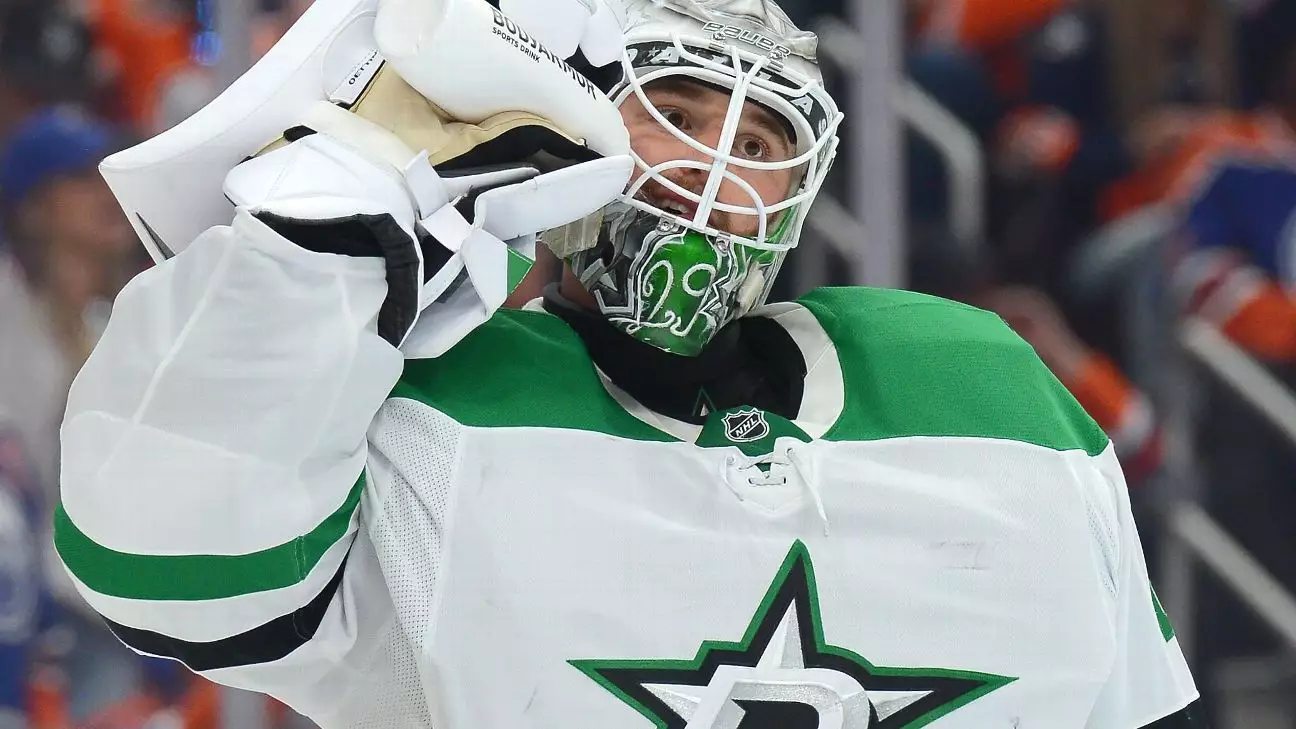In the high-stakes world of professional hockey, emotions run high, and decisions can change the trajectory of a season in mere moments. Dallas Stars goaltender Jake Oettinger found himself thrust into the spotlight during Game 5 of the Western Conference Finals, not for accolades but for a shocking early exit. Pulled just over seven minutes into the game after surrendering two goals on the only two shots he faced, Oettinger expressed surprise and embarrassment, reminiscent of the turbulent emotions athletes endure when circumstances spiral out of their control. Although his head coach, Peter DeBoer, supported the decision, the aftermath left questions lingering over the team’s dynamics and Oettinger’s personal journey.
Coaching Under Pressure
DeBoer’s candid admission that he is a “biggest fan” of Oettinger reveals the complexity of the coach-player relationship. The pressure to win can lead to gut-wrenching choices—decisions made not purely based on performance but as a tactical maneuver for survival in a grueling playoff series. The vulnerability of players like Oettinger, who are seen as cornerstones of their teams, underscores the weight they carry on their shoulders; and in this case, DeBoer felt a compelling urgency to change direction quickly. “How do we survive this and get it to a Game 6?” echoes the primal instincts that coaches must navigate.
The unfortunate outcome—a 6-3 defeat—raised eyebrows, yet in retrospect, is it fair to claim that the coach’s decision was solely to blame? Perhaps, as fans and analysts, we often forget that behind every significant decision lies intricate layers of strategy, pressure, and instinct.
A Goalie’s Perspective on Growth
From the chaos of his early exit, Oettinger emerged with a renewed perspective—one that prioritizes personal growth and resilience. “How can I make those saves that I made all playoffs?” he asked, shifting the focus away from disappointment towards self-improvement. Athletes often grapple with the fine line between personal responsibility and external circumstances, but Oettinger appears to navigate this tension wisely. His attitude reflects a deeper understanding that setbacks, often seen as failures, can serve as springboards for future success.
His stats during the playoffs reaffirm his potential, with a save percentage of .905 after facing an astonishing 503 shots—a toll unmatched by any opponent in the postseason. Yet, the challenge is not merely statistical. The mental grind, coupled with the emotional rollercoaster of playoff hockey, tests not only physical skills but also mental fortitude. Oettinger acknowledges this complexity, hinting at an evolving mindset that embraces the mental battles of the game, a crucial element many overlook.
Significance of a Goalie’s Mentality
The role of a goalie transcends the physical demands; it is equally rooted in mental acuity. Oettinger’s conviction that he is “one of the best in the world” when functioning at peak performance resonates powerfully. Such self-belief becomes essential for athletes confronting adversity. The thoughts circulating in a goalie’s mind can lead to split-second decisions that either elevate a team or invite downfall. Oettinger’s awareness of this dichotomy plays a pivotal role in his approach to the game. The notion that “all the extra stuff is just extra stuff,” encapsulates his focus on honing his skills rather than getting lost in the noise surrounding team dynamics and public perception.
Interestingly, DeBoer noted possible fatigue and underlying respiratory issues Oettinger dealt with earlier in the series, illustrating the physical burdens that can compound mental challenges. Coaches must weigh the need for rest against the urgency for performance, creating a precarious balancing act that can have dire implications for a team’s postseason run.
Looking Ahead: A Bright Future
Despite the disappointment, there exists an undeniable aura of optimism surrounding Oettinger. His acknowledgment that this experience will teach him valuable lessons signals a proactive mindset for the upcoming seasons. His recent seasons have seen growth, as he’s been in the playoffs for four consecutive years, marking a significant path of improvement where he has garnered the ability to analyze failures and turn them into catalysts for success.
As the Dallas Stars reflect on yet another near-miss in the playoffs, the determination to rise again is palpable. Oettinger stands as a testament to resilience, committed to not only returning to the ice but to improving with every challenge faced. Setbacks are merely steps on the path to greatness, and Oettinger is poised to grow stronger, both as a goaltender and as an athlete capable of overcoming adversity. The landscape of the future now appears promising for both him and the franchise, marked by persistence and a zeal to push beyond boundaries.

